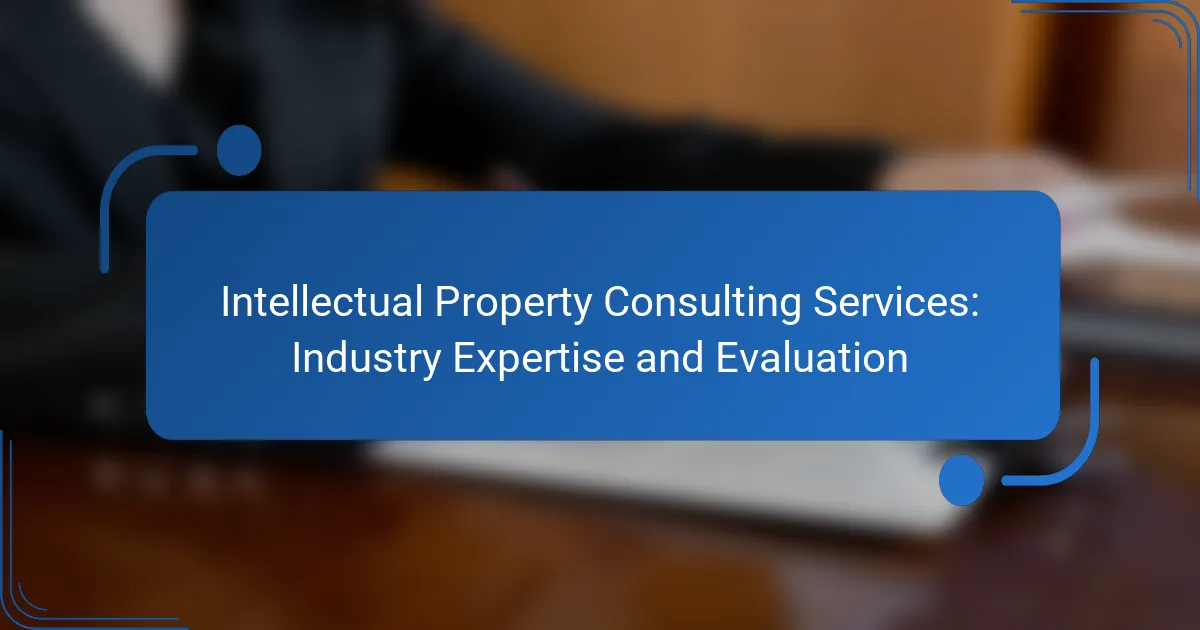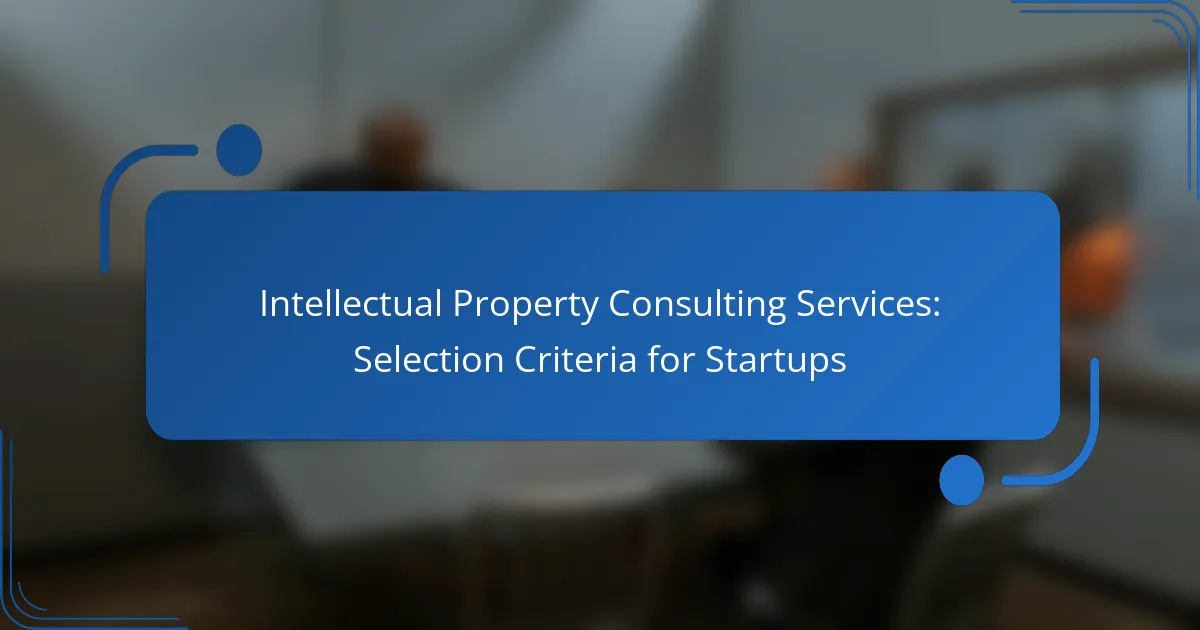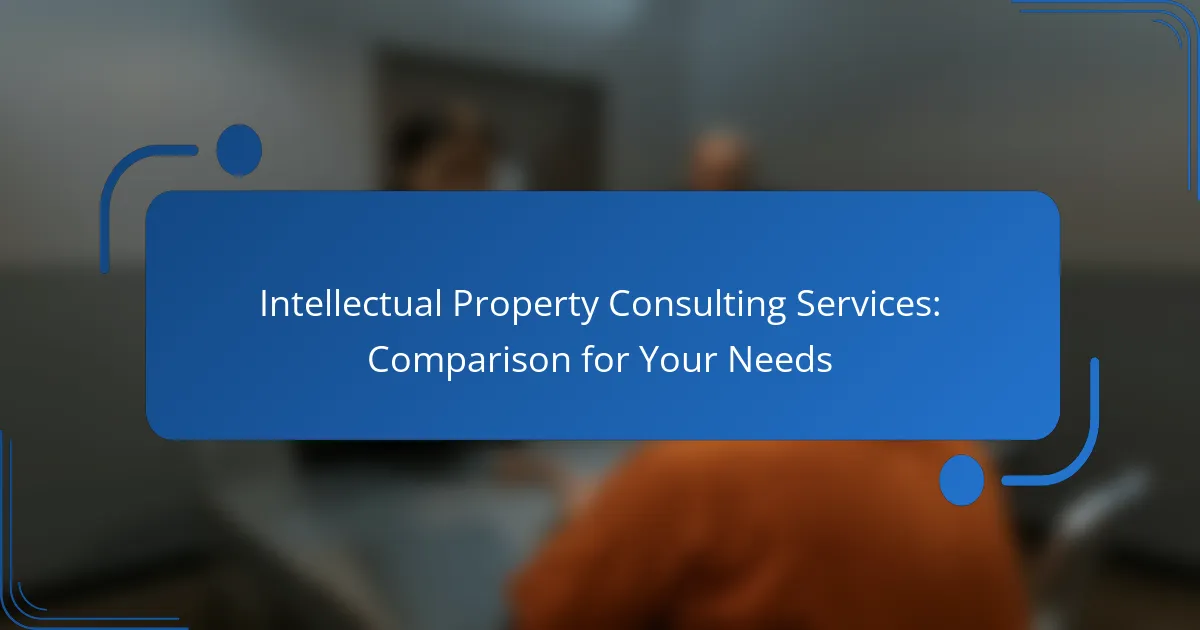Intellectual property consulting services provide essential support for businesses seeking to protect and manage their intellectual property rights effectively. By leveraging industry expertise, these consultants evaluate IP assets using various valuation methods and market analysis techniques, ensuring a thorough understanding of their worth and potential. Engaging an IP consultant not only enhances strategic insight but also helps companies navigate complex legal frameworks to maximize asset value and minimize risks.
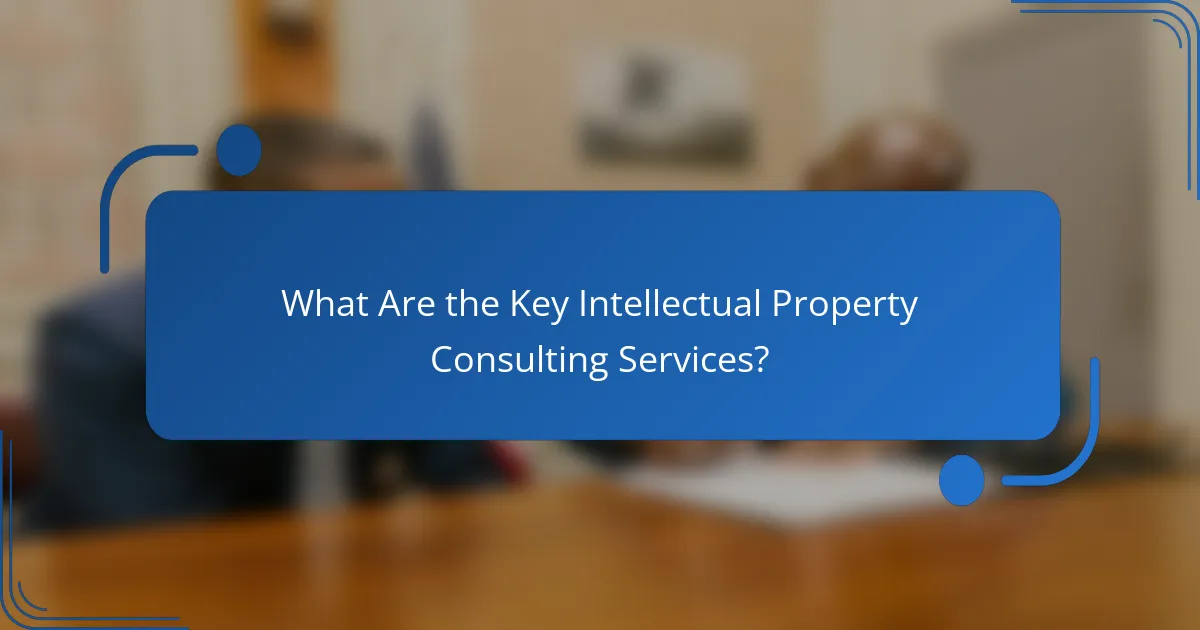
What Are the Key Intellectual Property Consulting Services?
Intellectual property consulting services encompass a range of professional support aimed at protecting and managing intellectual property rights. These services help businesses navigate the complexities of patents, trademarks, copyrights, trade secrets, and overall IP strategy.
Patent consulting
Patent consulting involves advising clients on the patent process, including application preparation, filing, and prosecution. Consultants help assess the patentability of inventions and guide clients through the necessary documentation and legal requirements.
Common pitfalls include failing to conduct a thorough prior art search or misclassifying an invention. Engaging a consultant can help mitigate these risks and enhance the chances of securing patent protection.
Trademark registration
Trademark registration services assist businesses in securing legal protection for their brand names, logos, and slogans. This process includes conducting trademark searches to ensure no conflicts exist and preparing the necessary applications for submission to the relevant authorities.
It’s crucial to understand the differences between national and international trademark laws, as registration processes can vary significantly. For example, in the U.S., the United States Patent and Trademark Office (USPTO) oversees registrations, while the European Union has its own system through the European Union Intellectual Property Office (EUIPO).
Copyright evaluation
Copyright evaluation services focus on assessing the originality and ownership of creative works, such as literature, music, and software. Consultants help clients understand their rights and the scope of protection available under copyright law.
It’s important to note that copyright protection is automatic upon creation in many jurisdictions, but registration can enhance enforceability. Clients should consider registering their works to strengthen their legal standing in case of infringement.
Trade secret protection
Trade secret protection services involve strategies to safeguard confidential business information, such as formulas, practices, and processes. Consultants help develop policies and practices to maintain secrecy and prevent unauthorized disclosure.
Implementing non-disclosure agreements (NDAs) and employee training programs are effective measures to protect trade secrets. Businesses should regularly review their practices to ensure compliance and adapt to changing regulations.
IP strategy development
IP strategy development services assist organizations in creating a comprehensive plan for managing their intellectual property assets. This includes identifying valuable IP, aligning it with business goals, and determining the best methods for protection and monetization.
A well-defined IP strategy can enhance competitive advantage and drive innovation. Companies should regularly assess their IP portfolio and adjust their strategies to respond to market changes and technological advancements.
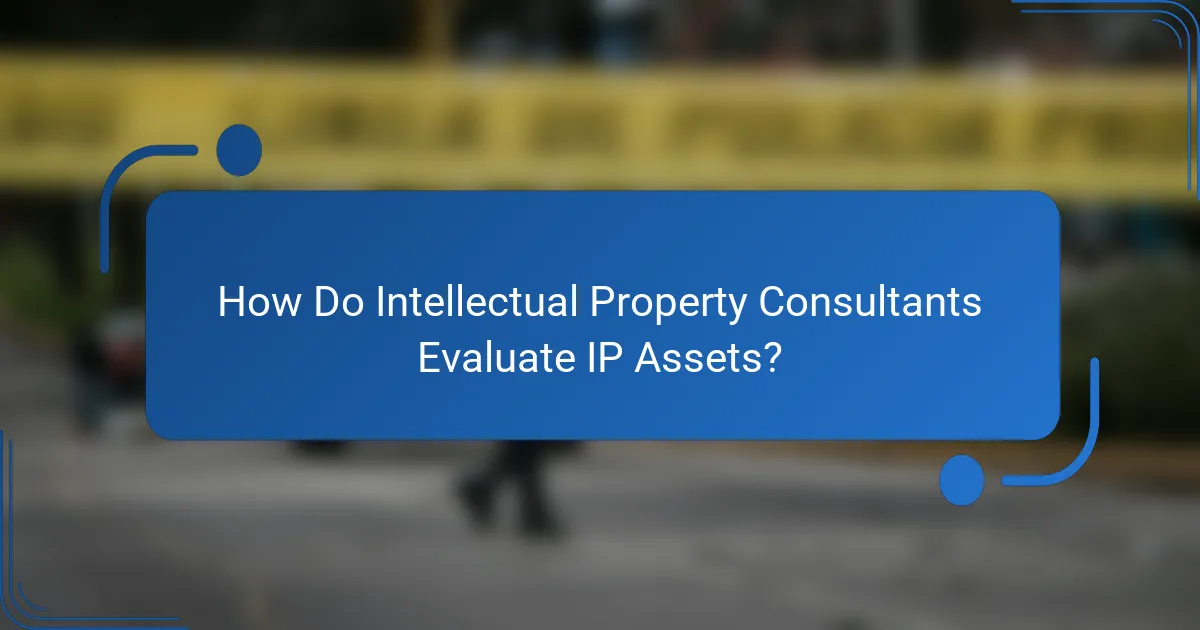
How Do Intellectual Property Consultants Evaluate IP Assets?
Intellectual property consultants evaluate IP assets by employing a combination of valuation methods, market analysis techniques, and risk assessment frameworks. This multifaceted approach ensures a comprehensive understanding of an asset’s worth and potential in the marketplace.
Asset valuation methods
Asset valuation methods for IP typically include cost, market, and income approaches. The cost approach assesses the expenses incurred in developing the IP, while the market approach compares similar assets to determine value. The income approach estimates future cash flows generated by the IP, discounted to present value.
Consultants often use a combination of these methods to arrive at a more accurate valuation. For instance, if a patent generates steady revenue, the income approach may carry more weight in the final assessment.
Market analysis techniques
Market analysis techniques involve researching industry trends, competitor performance, and consumer demand to gauge the potential of IP assets. This may include SWOT analysis (Strengths, Weaknesses, Opportunities, Threats) and benchmarking against similar assets in the market.
Consultants may also utilize surveys and focus groups to gather insights on consumer perceptions and willingness to pay. Understanding market dynamics is crucial for positioning IP assets effectively and maximizing their value.
Risk assessment frameworks
Risk assessment frameworks help identify potential threats to the value of IP assets, including legal, market, and operational risks. Common frameworks include qualitative assessments, which categorize risks based on their likelihood and impact, and quantitative models that assign numerical values to these risks.
Consultants often recommend strategies to mitigate identified risks, such as securing stronger legal protections or diversifying revenue streams. Regularly updating risk assessments ensures that IP assets remain resilient in a changing market landscape.

What Are the Benefits of Hiring an IP Consultant?
Hiring an IP consultant provides specialized knowledge and strategic insight into intellectual property management, helping businesses maximize their assets and minimize risks. These professionals can guide companies through complex legal frameworks and enhance the overall value of their intellectual property portfolio.
Expertise in IP law
IP consultants possess in-depth knowledge of intellectual property law, including patents, trademarks, copyrights, and trade secrets. Their expertise allows them to navigate the intricacies of legal requirements and ensure compliance with local and international regulations.
For example, a consultant can assist in conducting thorough patent searches to avoid infringement and advise on the best strategies for protecting innovations. This expertise is crucial for businesses looking to secure their competitive advantage in the market.
Increased asset value
Engaging an IP consultant can significantly enhance the value of a company’s intellectual property assets. By identifying and leveraging underutilized IP, consultants help businesses capitalize on their innovations and brand equity.
For instance, a consultant might recommend licensing agreements or partnerships that can generate additional revenue streams. This proactive approach can lead to a measurable increase in the overall valuation of the company.
Risk mitigation strategies
IP consultants play a vital role in identifying potential risks associated with intellectual property. They can develop strategies to mitigate these risks, such as conducting regular audits and implementing robust monitoring systems.
Additionally, they can provide guidance on how to respond to infringement claims and manage disputes effectively. By having a solid risk management plan in place, businesses can protect their assets and maintain their market position.
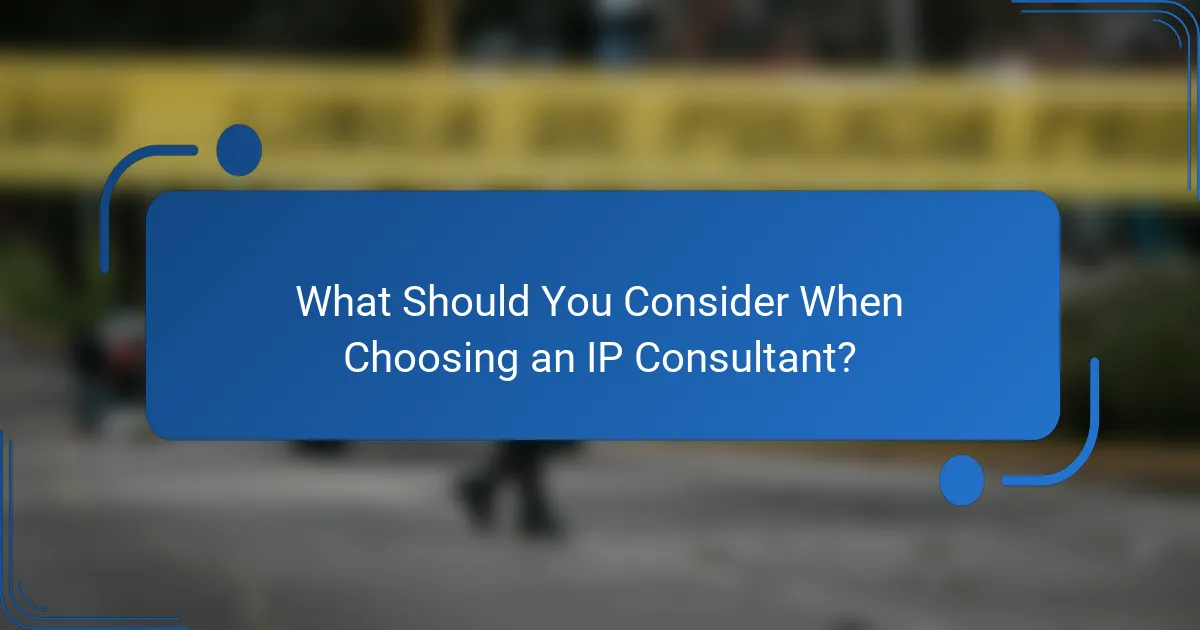
What Should You Consider When Choosing an IP Consultant?
When selecting an intellectual property (IP) consultant, consider their expertise, reputation, and the range of services they offer. A well-rounded consultant can provide tailored advice that aligns with your specific IP needs and industry standards.
Industry experience
Industry experience is crucial when choosing an IP consultant. Look for professionals who have a proven track record in your specific sector, as they will better understand the unique challenges and opportunities you face. For example, a consultant with experience in technology may be more adept at navigating software patents than one focused on consumer goods.
Additionally, consider the consultant’s familiarity with relevant regulations and standards in your country, such as the United States Patent and Trademark Office (USPTO) guidelines or the European Patent Office (EPO) practices. This knowledge can significantly impact the effectiveness of their advice.
Client testimonials
Client testimonials provide valuable insights into an IP consultant’s effectiveness and reliability. Look for reviews that highlight successful outcomes and satisfaction with the consultant’s services. Positive feedback from clients in similar industries can indicate that the consultant is well-equipped to meet your needs.
Consider asking for references or case studies that demonstrate the consultant’s ability to handle projects similar to yours. This can help you gauge their problem-solving skills and overall approach to IP management.
Service offerings
Evaluate the range of services offered by the IP consultant. A comprehensive service portfolio may include patent filing, trademark registration, IP strategy development, and litigation support. Ensure that the consultant can address all aspects of your IP needs, from initial assessments to ongoing management.
Additionally, inquire about their approach to IP audits and evaluations, as these can help identify potential risks and opportunities in your IP portfolio. A consultant who offers tailored solutions will likely provide more value than one with a one-size-fits-all approach.
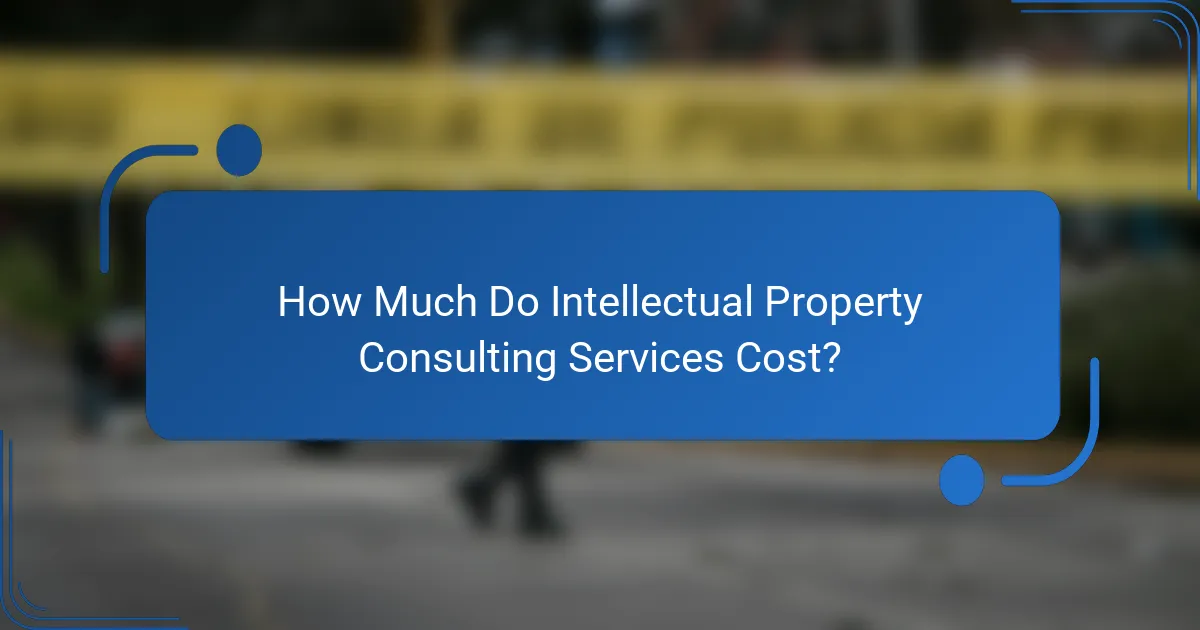
How Much Do Intellectual Property Consulting Services Cost?
The cost of intellectual property consulting services can vary widely based on factors such as the complexity of the project, the consultant’s expertise, and the specific services required. Generally, fees can range from a few hundred to several thousand dollars, depending on the scope and depth of the consultation.
Factors Influencing Costs
Several key factors influence the pricing of intellectual property consulting services. First, the type of intellectual property involved—patents, trademarks, copyrights, or trade secrets—can significantly affect costs. Additionally, the consultant’s experience and reputation in the industry often correlate with higher fees.
Geographical location also plays a role; for instance, consulting services in major cities may be more expensive than in smaller towns. The complexity of the case, such as the need for extensive research or legal support, can further increase costs.
Typical Pricing Models
Consultants may charge by the hour, with rates typically ranging from $100 to $500 per hour, depending on their expertise. Some firms offer flat fees for specific services, such as trademark registration or patent searches, which can range from $1,000 to $5,000 or more.
Retainer agreements are another common model, where clients pay a set fee for ongoing services. This can be beneficial for businesses that require regular consultations or support in managing their intellectual property portfolios.
Budgeting for Consulting Services
When budgeting for intellectual property consulting, it’s essential to clearly define your needs and expectations. Start by outlining the specific services you require and obtaining quotes from multiple consultants to compare pricing.
Consider setting aside a contingency budget for unexpected expenses, such as additional research or legal advice. Engaging in a detailed discussion with potential consultants about their pricing structure can help avoid surprises later on.
